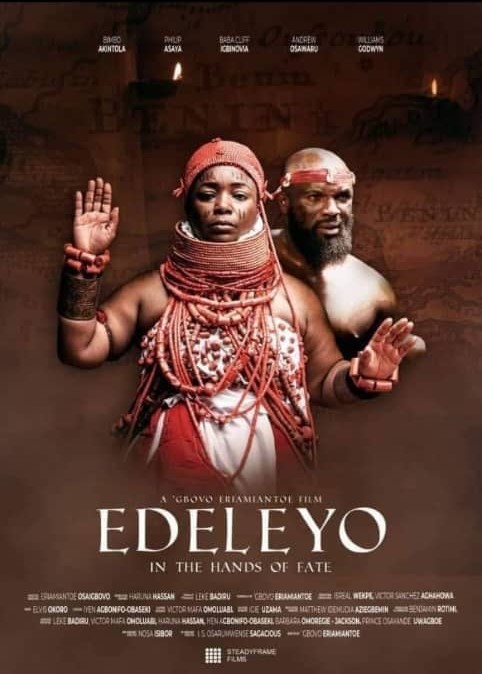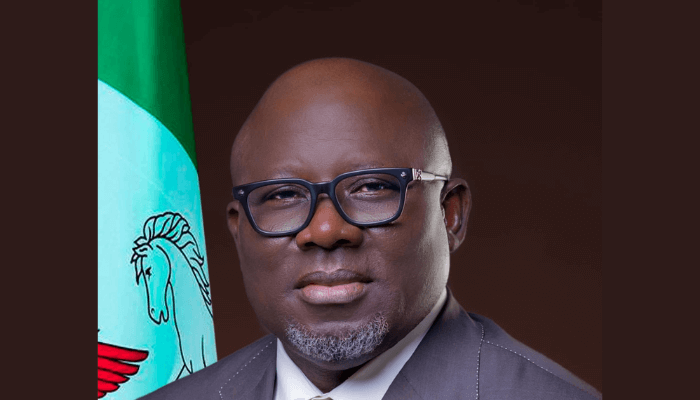Dr. Osaigbovo Eriamiantoe, multiple award-winning filmmaker and director, has an interesting story to tell about himself and his journey as a filmmaker despite graduating from medical school.
“Growing up, the evenings were my favourite time of the day. This was because, that was the time we were told bedtime stories by my older siblings,” Dr. Eriamiantoe narrates.
“Later, I grew up enough to tell stories to my siblings too. While I tell my stories, my siblings unanimously agreed that my stories were interesting, but that I almost always falsified stories that did not sound like previously told ones. So at a tender age, it was obvious that I was going to grow up to become a storyteller or a liar. So, because I didn’t want to go to hell, I settled for the former. I soon developed myself in different forms of storytelling. To prose, poetry and later drama. This contributed greatly to my ability to write my first screenplay and later TV series script in my last year in secondary school.
“When I got into the medical school, I felt it was time to abandon storytelling and face ‘Medicine’ as I didn’t see any connection between them. I looked forward to becoming a doctor, so that I would be able to ‘cure every ailment’. My first shock came during my Junior Posting in surgery. We were doing our posting when some patients were rushed in. We were told they were travelling when they were involved in a road traffic accident. One of them was rushed into the theatre to have a splenectomy done. Luckily, I was one of the students who were asked to drape and join the surgeons in the theatre. I was excited. After what seemed like forever, the surgery was over. We had just saved a patient. Alongside with the others, I walked out of the theatre majestically, based on who I be as a lifesaver (laughs). We were close to the A&E when I heard loud screams. People were crying aloud. I was later to find out that one of the patients involved in that accident had died. He had a head injury. He died while preparing to have a skull X-Ray (or so). I felt really bad. Why has this spoilt my fresh testimony? Seeing how bad I felt, one of the residents tapped me on my shoulder and said ‘in medical practice, you can only save one person at a time’. Though that was supposed to be an encouragement, it disappointed me. I had hoped to practice the type of medicine where everyone who came to me would be saved. This was not the medicine I wrote JAMB to study. At that point, I lost interest in ‘the medicine’. I went through the rest of the postings not sure I would practice. I even boasted to my friends that this was a first degree, that I would practice something else.
“My eureka moment came in Ogbona village. We were doing our rural posting when I was assigned to write and direct a stage play on the connection between immunization and social status. The play was to be staged in the palace of the paramount ruler of Ugbekpe-Ekperi. I wrote the playlet, directed and even acted in it. While the play was going on, I saw how the villagers watched with rapt attention. I saw how they were entertained and more importantly how they were educated about the theme. After the playlet, they narrated accurately what we intended for them to learn. Standing close to the exit door of the Palace, I told myself, ‘I have just treated over 300 persons at the same time. This is the type of medicine I want to practice’. That was it. After graduation, I resurrected my sleeping career in storytelling. I bought every book I could find about filmmaking. I attended classes and masterclasses. I saw filmmaking first of all as a veritable tool for health education. I soon wrote and shot films on drug misuse, cyber bullying and other public health problems. What started like a hobby soon became a career when my film on Tramadol and codeine misuse was screened at the Association of Public Health of America’s annual convention in 2020.
“Today, with over 20 nominations and awards from film festivals all over the world, I am confident to say that I treat people by making films.”
My meeting with Dr. Gbovo was in the year 2021. It was a Saturday and I had come for theatre rehearsals at Ekehuan. The rehearsals were rigorous, physical. They had to be. We danced. We sang. We acted. We read lines. We had to memorize them. Anyone who knows how on-stage drama works knows that once you climb that stage, you are on your own. No director comes to tell you “Cut!” or “Action!”. You better know your lines. And so we were rehearsing for the Adesuwa play and Dr. Gbovo came in to see us. He interacted with us and left thereafter.
Stanlee Ohikhuare had a masterclass for filmmakers in Benin City at the Victor Uwaifo Creative Hub. The Edo State government had just built that facility for creatives but I had never been there before. I missed my way until I eventually found it when someone redirected me by calling it The Nigerian Observer building. I came in to meet my classmates. A moment later, Dr. Gbovo came in. We had an intensive session with Stanlee Ohikhuare where we were taught the fundamentals of cinematography. We were given the opportunity to create our own stories. It was Dr. Gbovo who aced all of us.
And then pre-production plans went underway for the short we were assigned to produce. Now, you will notice that most directors tend to be domineering, but I noticed Dr. Gbovo had a different approach. His style of directing, I noticed, is rather empathetic. You naturally want to do what he asks without him even asking. Anyway, the Adesuwa play came and went and he was enthusiastically supportive.
And then came a play directed by Noble Isaka, called ‘Leave Me Alone To Die’. Dr. Gbovo was there. And then a friend from my ROK training days, Kelechi Ophir who was in production/camera class, arranged an event with Femi Irojemi, Victor Omozee Eyike and Dr. Gbovo.
And when Victor Eyike screened “Sons of Nora” at Deepend Cinemas, he was there.
Usually I go to the basement at the University of Benin to write scripts as it requires a lot of solitude. I was returning from a writing sessions and he was there. When The Nigerian Observer was revived last year, and the prints came out, he was there.
And when I was having struggle telling stories right, I needed some formula, he was there.
When Dr. Gbovo or Gbovo The Storyteller’s ‘Edeleyo’ won at the film festival last year, he was there. He was always there.
I used to play in defence in my secondary school days and Dr. Gbovo reminds me of that passionate playmaker, like Jay Jay Okocha, or a quintessential midfielder whose presence in the team boosts morale.
Records upon records upon records. Presence upon presence upon presence. Artistry upon artistry upon artistry. Awards upon awards upon awards. Wins upon wins upon winning. Articles upon articles upon articles. All of these and still a doctor. Equilibrium.
Let’s examine a slice of Dr. Gbovo’s filmography.
FATBULOUS: Love comes in all shapes and sizes. ‘Fatbulous’ is an amalgam of ‘Fat’ and ‘Fabulous’, meaning being fat or plus size can be fabulous. This film promotes self-confidence and self-belief, especially in our society where appearance matters more than substance.
EDELEYO – IN THE HANDS OF FATE: Every kingdom needs a king. But suppose there is no heir or suppose the only heir is a woman? Dr. Gbovo’s ‘Edeleyo’ tells the authentic story of a woman who almost became Oba. Or as they say, “Nearly cannot kill a bird”.

Other film titles with Dr. Gbovo’s signature include ‘A Different Cell’, ‘Anonymous’, ‘Covidiot’, ‘From Sambisa With Love’, ‘Hooked’, and many others still in the offing.
CONCLUSION: Artistry never ends. It is infinite. It is one thing to be interested in a field; it is another thing to be fully submerged in it, like Gbovo The Storyteller has been. He remains a personal source of support and inspiration to me. I always know I can count on his professional advice to surmount my challenges in the film industry. I wish him more success in his career and personal life. In Nigerian parlance, “more ororo to his elbow” as he continues to proclaim and exude the brilliance and artistic majesty of ‘Edo to the World’.


